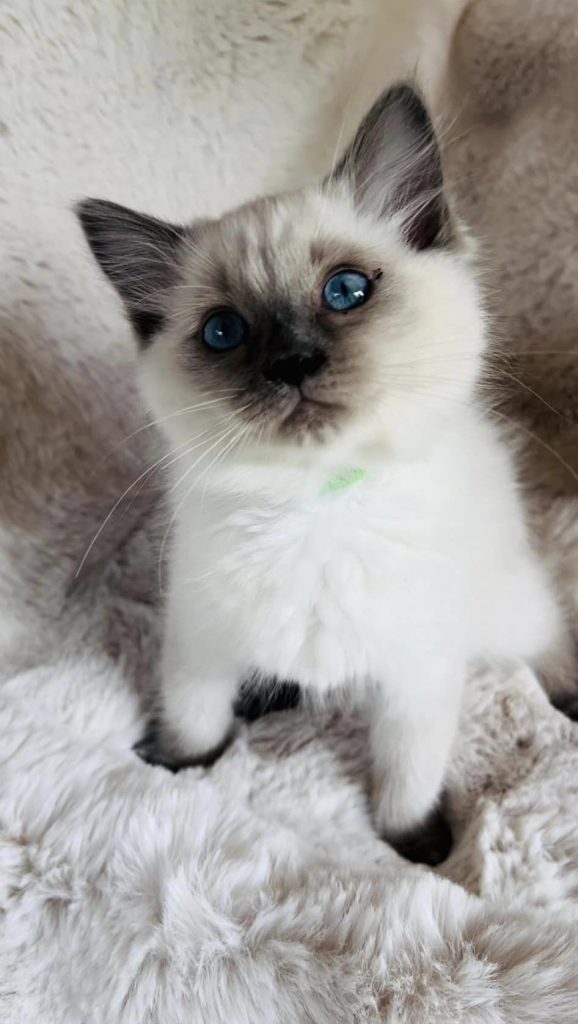Ragdoll cats are known for their gentle temperament, stunning appearance, and affectionate nature, making them popular companions in many households. Whether you’re welcoming a playful Ragdoll kitten or an adult Ragdoll cat into your home, providing proper care is essential to ensure their health, happiness, and well-being. Here’s a comprehensive guide on how to care for Ragdoll kittens and cats:

1. Feeding and Nutrition:
Ragdoll kittens:
- Frequency: Feed Ragdoll kittens small, frequent meals throughout the day.
- Quality: Choose high-quality kitten food formulated for growth and development. Look for products that list meat as the first ingredient and avoid fillers like corn or by-products.
- Water: Always provide fresh water for your kitten, and ensure it’s easily accessible.
Adult Ragdoll cats:
- Balanced Diet: Feed adult Ragdoll cats a balanced diet suitable for their age, weight, and activity level. Consider feeding them wet food, which can help maintain hydration.
- Portion Control: Monitor their food intake to prevent obesity, which can be a concern in Ragdolls.
- Treats: Offer treats in moderation and choose healthy options such as freeze-dried meat or catnip treats.
2. Grooming:
Ragdoll kittens:
- Brushing: Begin grooming Ragdoll kittens early to get them accustomed to brushing. Use a soft brush or comb to gently remove loose fur and prevent matting, especially in their semi-long coat.
- Nail Care: Trim their nails regularly to prevent them from becoming too sharp. Start with gentle handling of their paws to accustom them to the process.
Adult Ragdoll cats:
- Regular Brushing: Brush adult Ragdoll cats at least once a week to remove loose fur and reduce shedding. Increase brushing frequency during shedding seasons.
- Ear Cleaning: Check their ears regularly for dirt or wax buildup. Use a veterinarian-approved ear cleaning solution and cotton ball to gently clean the outer ear.
3. Veterinary Care:
- Vaccinations: Keep up-to-date with vaccinations recommended by your veterinarian to protect against common diseases.
- Routine Check-ups: Schedule regular veterinary visits for health check-ups, vaccinations, and dental care.
- Parasite Prevention: Administer flea, tick, and parasite prevention treatments as recommended by your vet.
4. Exercise and Play:
- Interactive Play: Engage Ragdoll kittens and cats in interactive play sessions using toys such as feather wands, laser pointers, or interactive puzzles. This helps stimulate their mind and fulfill their natural hunting instincts.
- Scratching Posts: Provide scratching posts or pads to satisfy their scratching behavior and help keep their claws healthy.
- Indoor Environment: Create a stimulating indoor environment with climbing structures, cozy beds, and hiding spots to keep them physically and mentally active.
5. Socialization and Attention:
- Affection: Ragdoll cats thrive on companionship and enjoy spending time with their human family members. Provide them with daily interaction, petting, and cuddling to strengthen your bond.
- Introducing New Pets: Introduce new pets gradually and supervise interactions to ensure a positive experience for both your Ragdoll cat and the new addition.
- Enrichment: Rotate toys and provide new experiences to prevent boredom and enrich their environment.
6. Environmental Considerations:
- Litter Box: Provide a clean litter box in a quiet, easily accessible location. Scoop the litter box daily and change the litter completely every 1-2 weeks.
- Safe Space: Create a safe and quiet space where your Ragdoll cat can retreat and feel secure, especially if they become stressed or overwhelmed.
- Temperature: Ragdolls are sensitive to temperature extremes. Ensure their living environment is comfortable and well-ventilated, avoiding drafts and direct sunlight.
7. Special Considerations for Ragdoll Cats:
- Heat Sensitivity: Ragdolls may be more sensitive to heat due to their semi-long coat. Ensure they have access to cool areas and provide plenty of fresh water, especially during warmer months.
- Handling: Due to their trusting nature, Ragdoll cats may be more prone to injury from falls or accidents. Handle them gently and supervise interactions with children or other pets.
Conclusion:
By providing proper nutrition, grooming, veterinary care, exercise, socialization, and a safe environment, you can ensure that your Ragdoll kitten or cat lives a happy and healthy life. Understanding their unique characteristics and needs will help you develop a strong bond and enjoy many years of companionship with your Ragdoll companion.
For more personalized advice and guidance, consult with your veterinarian or reputable Ragdoll breeders like Royal City Ragdolls in Guelph, Ontario, who can offer specific insights into caring for Ragdoll kittens and cats.
